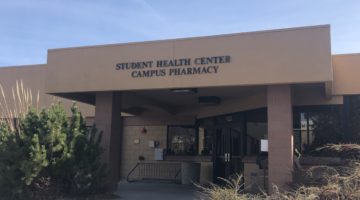
The Student Health Center as it stands on Monday, Feb. 4. The Student Health Center Director Cheryl Hug sent an email to students addressing the issue of the viral outbreak.
The World Health Organization’s Emergency Committee met on Thursday, Jan. 30, to discuss the recent outbreak of 2019 Novel coronavirus (2019-nCoV) and whether or not to declare a national emergency. During their meeting, the officials decided to name the issue as a public-health emergency due to person-to-person transmission.
The Center for Disease Control states the virus originated in Wuhan, China. The outbreak is believed to be caused by seafood and livestock markets located in close proximity to human living spaces.
2019-nCoV is one of many coronaviruses commonly found in livestock, but is also transmittable to humans. The disease is similar to MERS and SARS viruses, which are also a part of the coronavirus family. 2019-nCoV is also transmittable through human-to human contact.
The virus was first reported to the WHO from Wuhan on Dec. 31, 2019. Since then, over 20,000 cases have been reported, and of those, 427 deaths have occurred. There are 11 confirmed cases of the virus in the U.S., appearing in Washington, Illinois, California and Arizona. The virus is also present in over 20 countries including Australia and the U.K.
The University of Nevada, Reno’s Student Health Center Director Cheryl Hug sent an email to students addressing the issue of the viral outbreak.
“Symptoms may occur in as little as two days or as long as 14 days after exposure,” the email stated. “This virus probably originated from an animal source, but now appears to be spreading from person to person. It is likely that the virus is spread by respiratory droplets produced from coughs or sneezes, similar to the cold or flu.”
In an interview, Hug also said college campuses are particularly vulnerable places for diseases such as the flu and other respiratory illnesses to occur. She said this was because of the large collection of students living in close proximity to one another. She also stated she didn’t think UNR was a place for 2019-nCoV to occur because of the five reported cases at the time.
The Chair of Family and Community Medicine Dr. Daniel Spogen weighed in on the issue, stating 2019-nCoV is a new virus medical professionals know very little about. Because of this, he said, the virus being in the U.S. is a large concern.
“A couple of weeks ago, in China, there was roughly 60 cases reported,” Spogen said in an interview with The Nevada Sagebrush on Thursday, Jan. 30. “Now there are over 6,000 cases. So this has gone from 60 to 6,000 in a period of two weeks… Anybody that’s had any connection with the Chinese population puts us at risk for catching it.”
The amount of cases worldwide doubled to over 12,000 in two days. Spogen said there is an incubation period of approximately 10 to 14 days—meaning that the body does not show any virulent symptoms, during which time it may be spread through respiratory droplets and human contact.
“We don’t know what we’re working with,” FCM Care Coordinator Kathryn “Katy” Milone said. “We are more concerned about this because this fella is very new to us and it is because it is so new to us that we need to take the necessary precautions until we understand more about it.”
Milone talked about the services the FCM provides in order to prevent a potential epidemic. She said the center encourages people who believe they are having flu-like symptoms to keep themselves isolated. She also said patients may stay in their cars outside of the FMC because of the self-isolating environment. From there, doctors are able to check patients inside their cars to keep any potential virus contained.
The SHC encourages students to wash their hands frequently, avoid touching their face and seek medical attention if they are exhibiting flu-like symptoms and have any connections to Wuhan and the surrounding area.
“We don’t anticipate that we’re going to see a case here on campus,” Hug said. “I think that’s an important point to make. But we are prepared if we do and the infection control parameters that we have at the student health center are in place for this virus as well as any other.”
The mortality rate for 2019-nCoV remains between 2-3 percent. The death rate of those hospitalized is approximately 15 percent.
For more information on 2019 Novel Coronavirus, go to https://www.cdc.gov and https://med.unr.edu/student-health-center.
Sarah Strang can be found at sstrang@sagebrush.unr.edu or on Twitter @sarahstrang100.











